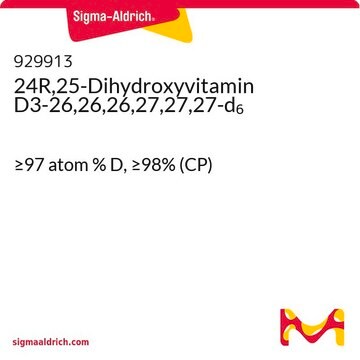739677
1α,25-Dihydroxyvitamin D2 solution
100 μg/mL in ethanol, 95% (CP)
Synonym(s):
1α,25-Dihydroxycalciferol solution
About This Item
Recommended Products
Quality Level
Assay
95% (CP)
form
liquid
concentration
100 μg/mL in ethanol
technique(s)
mass spectrometry (MS): suitable
color
colorless
storage temp.
−20°C
SMILES string
CC(O)(C)[C@@H](C)/C=C/[C@@H](C)[C@H]1CCC([C@]1(C)CCC/2)C2=C\C=C(C[C@@H](O)C[C@@H]3O)/C3=C
InChI
1S/C28H44O3/c1-18(9-10-19(2)27(4,5)31)24-13-14-25-21(8-7-15-28(24,25)6)11-12-22-16-23(29)17-26(30)20(22)3/h9-12,18-19,23-26,29-31H,3,7-8,13-17H2,1-2,4-6H3/b10-9+,21-11+,22-12-/t18-,19+,23-,24-,25?,26+,28-/m1/s1
InChI key
ZGLHBRQAEXKACO-KPKHAADHSA-N
Looking for similar products? Visit Product Comparison Guide
General description
related product
Signal Word
Danger
Hazard Statements
Precautionary Statements
Hazard Classifications
Eye Irrit. 2 - Flam. Liq. 2
Storage Class Code
3 - Flammable liquids
WGK
WGK 1
Flash Point(F)
57.2 °F - closed cup
Flash Point(C)
14.0 °C - closed cup
Regulatory Listings
Regulatory Listings are mainly provided for chemical products. Only limited information can be provided here for non-chemical products. No entry means none of the components are listed. It is the user’s obligation to ensure the safe and legal use of the product.
FSL
Group 4: Flammable liquids
Alcohols
Hazardous rank II
ISHL Indicated Name
Substances Subject to be Indicated Names
ISHL Notified Names
Substances Subject to be Notified Names
JAN Code
739677-VAR:
739677-1ML:4548173350141
739677-BULK:
739677-1ML-PW:
Choose from one of the most recent versions:
Already Own This Product?
Find documentation for the products that you have recently purchased in the Document Library.
Our team of scientists has experience in all areas of research including Life Science, Material Science, Chemical Synthesis, Chromatography, Analytical and many others.
Contact Technical Service









